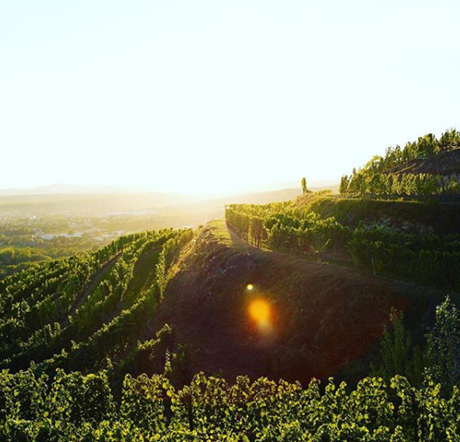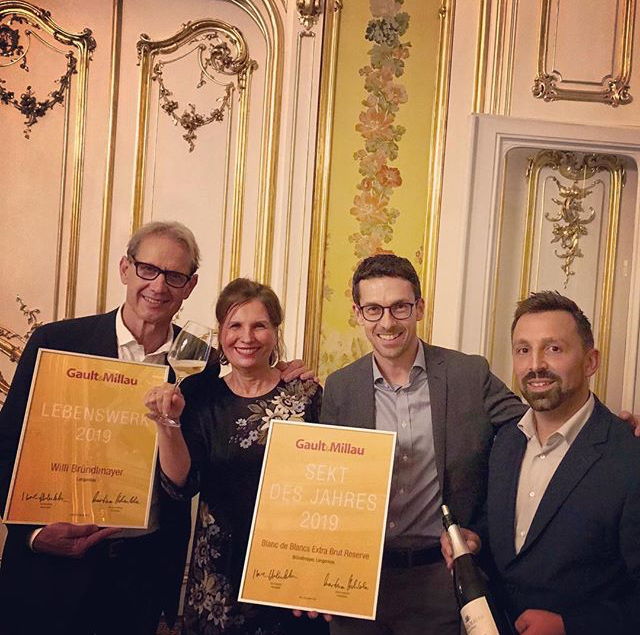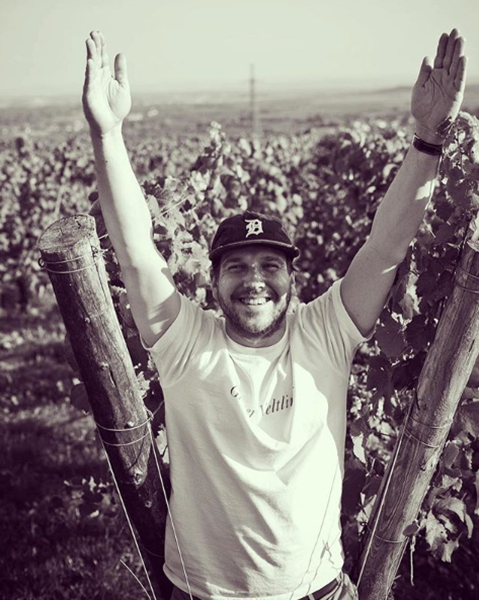It’s always great to see nice guys come first, so it was fantastic to see Willi Bründlmayer awarded the 2019 Lifetime Achievement Award from the Gault & Millau restaurant guide. This is recognition for a career in which he’s tirelessly flown the flag for quality Austrian wine, led the way in the sphere of viticulture, furthered the terroir cause by spearheading the Association of Traditional Austrian Wine Estates – and continued to be a thoroughly decent all-round gentleman.
He has a diverse and talented team there, too, with creative and equally affable son Vincent at the forefront alongside Andreas Wickhoff MW and Thomas Klinger, plus a dedicated support crew in the vineyard and cellar backing them up all the way.
The certified-organic estate has always been characterised by purity, elegance and thoughtfulness. That’s still emphatically the case, but this latest shipment sees Bründlmayer on its most exciting form ever.
RIESLING
2016 Bründlmayer Riesling Kamptal Terrassen RRP $43
This Riesling is a blend of wines sourced from different terraced (therefore high-quality) vineyards at altitudes ranging between 260 and 380m. The elevated terraces consist of stonier soils that bring fruit driven wines with mineral nuances and good aging potential. The vines from lower-sited terraces grow partly on layered fertile loess and bring earlier-maturing wines that are very expressive in their youth. By combining those two characteristics, Willi Bründlmayer obtains a Riesling that shows both finesse and a certain vigour. Alcohol 12.5%; acidity 8.5g/L; residual sweetness: dry.
This properly dry Riesling is so juicy and attractive. Plenty of depth, but tastes almost weightless. A wealth of white fruits, lemon zest and lemon blossom character, but also a hint of smoke. Drink now. 92 points. Stuart Pigott, jamessuckling.com November 2017
 2017 Bründlmayer Riesling Steinmassl RRP $64
2017 Bründlmayer Riesling Steinmassl RRP $64
The Steinmassl vineyard’s soil is primarily rocky with mica schist (quartz and mica).The vines are partially trained in the Lyre-system, a method which trains the vines to grow upward which in turn prevents fungal disease. The wine goes through extremely slow pressings of up to eight hours and sees prolonged skin contact overnight. Fermentation is done in stainless steel and maturation is completed on 5 to 10% of the lees. Alcohol 12.5%; acidity 7.9 g/L; residual sweetness: dry.
A totally original dry Riesling form the Danube valley that has a suave and supple feel on the front palate. Then, the firmness from the rocky soil comes through on the cool, lemony finish. From organically grown grapes. Drink or hold. 94 points. Stuart Pigott, jamessuckling.com October 2018
2017 Bründlmayer Riesling Heiligenstein Lyra RRP $131
The soil consists of approximately 270 million-year-old Permian desert sandstone, the sediments containing volcanic inclusions and carbonised remains of primeval vegetation. The uniqueness of this soil, its perfect gradient and position (SW to SE) provide ideal conditions for growing outstanding wines. Roughly 20% of the vineyard – the parcel used for this wine – is trained in the lyre trellis system. The wine is fermented in stainless steel tanks at temperatures of 15 to 20°C, and after fermentation the wine matures on the lees until it’s bottled in summer. Alcohol 13%; acidity 7.7 g/L; residual sweetness: dry.
Delicate pineapple nose, then a rich and precisely contoured palate that steers well clear of opulence, making this a very strong 2017 dry Riesling. Long, very clean and minerally finish. From organically grown grapes. Drink or hold. 94 points. Stuart Pigott, jamessuckling.com October 2018
2016 Bründlmayer Riesling Heiligenstein Lyra RRP $110
Alcohol: 13%; acidity 8g/L; residual sweetness: dry.
The fruitiest of Bründlmayer’s 2016 single-vineyard dry Rieslings with a slew of perfectly ripe peach. However, this is still a properly dry wine and it has a very serious structure. The finish is long, intense and bold, but with a wealth of refreshing minerality. Drink now and for many years to come. 96 points. James Suckling, jamessuckling.com October 2017
GRÜNER VETLINER
2017 Bründlmayer Grüner Veltliner Kamptal Terrassen RRP $39
This Grüner Veltliner is a blend of wines sourced from different terraced vineyards at altitudes of 260m to 380m. The elevated terraces consist of stonier soils (schisted granite) and the lower sited terraces are composed of layered fertile loess. The wine is fermented at semi-cool temperatures between 15 to 20°C. Alcohol 12.5%; acidity 6 g/L; residual sweetness: dry.
Kohlrabi, apple, coconut juice, spice. Chalky texture. Good acidity and flavour to go. Lemon peel, cucumber and juicy lemon. Tightens the nuts nicely on the finish, with a bit of pith and crunch to close. Good stuff. 92 points. Gary Walsh, The Wine Front October 2018
2017 Bründlmayer Grüner Veltliner Loiserberg RRP $53
A single vineyard wine, the Langenloiser Loiserberg vineyard contains soils primary of zoisite-amphibolite(mineral) rocks , which is a combination of granites consisting of gneiss, mica-schist, and some clay and loess. The wine is fermented at a moderate 15 to 20°C before being racked into large wooden barrels for further maturing. Alcohol: 12.5%; TA: 6 g/L; residual sweetness: dry.
Lots of dried-herb and lentil character on the nose. At once powerful and elegant, this is a really sophisticated 2017 Grüner Veltliner that’s more open than many of the top wines of the vintage. From organically grown grapes. Drink or hold. 94 points. Stuart Pigott, jamessuckling.com October 2018
2016 Bründlmayer Grüner Veltliner Vincents Spiegel RRP $121
The vineyards occupy an elongated ridge in the south of Langenlois. The deep, calcareous soils here are  derived from a thick underlying layer of loess with a balanced mineral composition. Occasional thin layers of sandy gravels and palaeosols indicate different climatic phases during the deposition of the loess. Vincent Bründlmayer took over this Grüner Veltliner vineyard from his family in 2010 and produced his first “Vincents Spiegel” in 2011. After the whole bunch cluster pressing, the wine is divided between wooden barrels (70%) – a mixture of Manhartsberg oak, acacia, French barrique – and stainless steel tank (30%). After fermentation, the wine is stirred on the lees for more than three months. Finally, the wine is blended and stored in large wooden barrels for further maturation. Alcohol: 12.5%; acidity: 6.3 g/L; residual sweetness: dry.
derived from a thick underlying layer of loess with a balanced mineral composition. Occasional thin layers of sandy gravels and palaeosols indicate different climatic phases during the deposition of the loess. Vincent Bründlmayer took over this Grüner Veltliner vineyard from his family in 2010 and produced his first “Vincents Spiegel” in 2011. After the whole bunch cluster pressing, the wine is divided between wooden barrels (70%) – a mixture of Manhartsberg oak, acacia, French barrique – and stainless steel tank (30%). After fermentation, the wine is stirred on the lees for more than three months. Finally, the wine is blended and stored in large wooden barrels for further maturation. Alcohol: 12.5%; acidity: 6.3 g/L; residual sweetness: dry.
A well-structured yet cool and rather sleek Grüner Veltliner with a rather closed nose, but very good potential if you can be patient. Long, firm and texturally complex finish. From organically grown grapes. Better from 2019. 93 points. Stuart Pigott, jamessuckling.com October 2018
